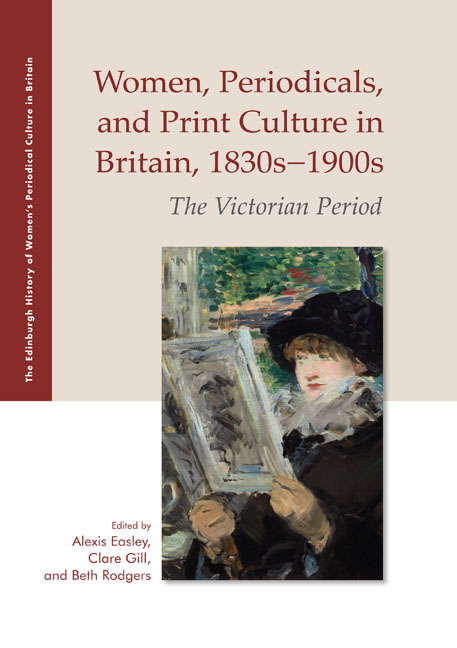Book contents
- Frontmatter
- Contents
- List of Illustrations
- Acknowledgments
- Introduction: Women, Periodicals, and Print Culture in the Victorian Period
- Part I (Re)Imagining Domestic Life
- (Re)Imagining Domestic Life: Introduction
- 1 The Rise and Rise of the Domestic Magazine: Femininity at Home in Popular Periodicals
- 2 Regulating Servants in Victorian Women's Print Media
- 3 Women Editors’ Transnational Networks in the Englishwoman's Domestic Magazine and Myra's Journal
- 4 Women and Family Health in the Mid-Victorian Family Magazine
- 5 Negotiating Female Identity in Nineteenth-Century Ireland
- 6 Women and the Welsh Newspaper Press: The Cambrian News and the Western Mail, 1870–1895
- Part II Constructing Modern Girls and Young Women
- Part III Women and Visual Culture
- Part IV Making Space for Women
- Part V Constructing Women Readers and Writers
- Part VI Intervening in Political Debates
- Notes on Contributors
- Index
- Plate section
6 - Women and the Welsh Newspaper Press: The Cambrian News and the Western Mail, 1870–1895
from Part I - (Re)Imagining Domestic Life
Published online by Cambridge University Press: 25 October 2019
- Frontmatter
- Contents
- List of Illustrations
- Acknowledgments
- Introduction: Women, Periodicals, and Print Culture in the Victorian Period
- Part I (Re)Imagining Domestic Life
- (Re)Imagining Domestic Life: Introduction
- 1 The Rise and Rise of the Domestic Magazine: Femininity at Home in Popular Periodicals
- 2 Regulating Servants in Victorian Women's Print Media
- 3 Women Editors’ Transnational Networks in the Englishwoman's Domestic Magazine and Myra's Journal
- 4 Women and Family Health in the Mid-Victorian Family Magazine
- 5 Negotiating Female Identity in Nineteenth-Century Ireland
- 6 Women and the Welsh Newspaper Press: The Cambrian News and the Western Mail, 1870–1895
- Part II Constructing Modern Girls and Young Women
- Part III Women and Visual Culture
- Part IV Making Space for Women
- Part V Constructing Women Readers and Writers
- Part VI Intervening in Political Debates
- Notes on Contributors
- Index
- Plate section
Summary
THIS CHAPTER DISCUSSES the ways in which women were represented in two important Welsh newspapers, the Cambrian News and the Western Mail, from 1870 to 1895. Both were predominately English-language papers, the former circulating in the rural west and north and the latter in the industrial and commercial south of the country at a time of rapid economic, social, and political change. They depicted a largely male-dominated world in which men played key roles in political, ecclesiastical, and civic life. At the same time, they also reported on the activities of women and, moreover, they did so in ways that indicated the complexity of women's roles in society at this time. Scholars such as Margaret Beetham (1996) and Sian Williams (2011) have noted the influence of separate spheres ideology on both English-and Welsh-language periodicals in the nineteenth century. This chapter, however, considers how Welsh newspapers, which served socially differentiated communities, represented women in ways that did not conform to this dominant ideology. For instance, under John Gibson, who edited the Cambrian News from 1873 until 1915, the paper was more radical in politics than the Conservative-supporting Western Mail. Gibson promoted the legal and social rights of women in the pages of the Cambrian News and in his book The Emancipation of Women, published in 1891 (A. Jones 1994; W. G. Evans 1992; Cayford 1992). The chapter falls into two parts. Part one contextualises the discussion by examining pertinent issues about the representation of women in periodicals, the role of women readers, and the development of Wales and the Welsh press. Part two takes a detailed look at the various representations of women's lives embedded in the Cambrian News and the Western Mail.
Part One: Contexts
Women's magazines were produced within a society in which, by the mid-nineteenth century, separate spheres ideology had attained widespread influence. This ideology upheld the notion that the place of women was in the home, dealing with family and private matters, while the place of men was in the world of work and civic and political action. It was an ideology informed by the ‘underlying precept that each sphere of activity and responsibility within society should be endowed with distinct gender connotations and obligations’ (R. Jones 2000: 179).
- Type
- Chapter
- Information
- Women, Periodicals and Print Culture in Britain, 1830s–1900sThe Victorian Period, pp. 84 - 96Publisher: Edinburgh University PressPrint publication year: 2019



